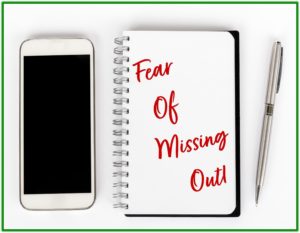 The fear of missing out afflicts us all. While some personalities do lean toward “FOMO” a bit more, everyone gets that nagging stab from time to time. And while the younger among us may feel the tug more often or with more zing, anyone can experience the anxiety-inducing fear of being left out, missing a big event, or simply not being part of the action.
The fear of missing out afflicts us all. While some personalities do lean toward “FOMO” a bit more, everyone gets that nagging stab from time to time. And while the younger among us may feel the tug more often or with more zing, anyone can experience the anxiety-inducing fear of being left out, missing a big event, or simply not being part of the action.
Science explains FOMO like this: The brain’s limbic system activates the survival instinct, a holdover from the days when community was a necessary component to securing food, water, and shelter. While we don’t need community in the same way as we did decades away, our flight/fight instinct now kicks in when our brain screams, “Don’t get left out!” Nevertheless, our desire and need for human connection and being included remain super strong.
Social media continually stokes the fires of FOMO, intensifying the fear of looking back on life, filled with “What if?” questions. And when the marketing industry picked up on this growing concept, Wa-Lah, FOMO marketing was born.
In a nutshell, FOMO marketing refers to marketing messages that appeal to the consumers’ desire to latch on to every opportunity before it slips forever through their fingers. Humans prefer to avoid risk. For some people, the “risk” of the consuming fear and regret over missing an opportunity or not making a particular purchase drives their decision-making.
For instance, an ordinarily non-adventurous sort on a once-in-a-lifetime vacation will push themselves to dive into activities and adventures they typically avoid. Because they fear the pangs of regret that may assault them when they return to their everyday, boring life, should they take a pass on any adventures this vacation offers.
FOMO marketing techniques
· Create urgency: Set a time limit
Deadlines create a sense of urgency regarding turning in an assignment on time or getting in on a great deal before it expires. There’s nothing like a ticking clock to up the ante on wanting something. And it’s those absolute deadlines that nudge people to get while the gettin’ is good to avoid the dreaded fear of missing out.
· Fuel a competitive spirit
Do you know what people dislike more than missing out? They cannot stand that others may get in on the incredible deal/opportunity/experience. Marketers can, and do take advantage of this competitiveness when they note how many people have “viewed this offer” or flash across the screen that “___ number of units have been sold” in the past hour/day/week. After all, if THAT many people are considering or have already closed the deal, what are YOU waiting for?
It’s worth mentioning that Millennials, who tend to be big spenders, with 60% willing to spend $4 on a single coffee and 69% known to buy clothes for reasons other than necessity, seem especially susceptible to FOMO. Research shows that—
- 69% of Millennials experience FOMO, the most of any age group
- Millennials are more likely to purposely create FOMO among their peers, with 33% admitting to having done so
- Those making more than $75,000 a year were not only the most prone to experience FOMO but also the most likely to broadcast their experiences on social media
Understanding the psychology behind the fear of missing out gives recruiting and staffing firms an edge in reeling in the best candidates and the most sought-after employers. And ASJ Partners has experience tweaking strategies and techniques to fit the staffing industry. Give us a ring today, and let’s get started.




